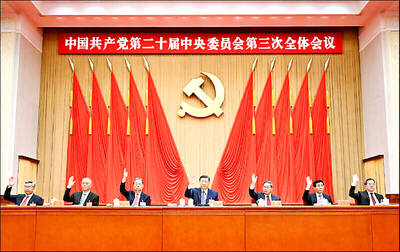Candidates seeking seats in the combined legislative and presidential elections set for January next year are legally eligible to open accounts to accept political donations after applying for Control Yuan approval.
Deputy Minister of the Interior Jonathan Chen (陳敬純) said applicants should be aware of the donation cap in the Political Donations Act (政治獻金法).
According to the act, any single donation per person to the same candidate must not exceed NT$100,000 (US$3,195) per year, while individual donations to multiple candidates may not exceed NT$200,000 per year.
There have been some calls from the public to amend the act to raise the total amount of donations per individual per year for different candidates due to the numerous kinds of elections, as well as the number of people who are eligible for donations.
The ministry has requested amendments that would raise the cap to NT$300,000 for multiple candidates, Department of Civil Affairs Deputy Director Lin Ching-chi (林清淇) said, adding that a draft amendment is awaiting review in the Legislative Yuan after its first reading at the end of last year.
The ministry wishes to maintain current rules for donations from individuals to a single candidate, Lin said.
“We hope that all candidates keep in mind that certain businesses and groups are not allowed to make political donations: Those without the right to vote; companies or factories with large government contracts or sales; indebted firms that have yet to pay said debt; and citizens of Hong Kong, Macau, China or other foreign citizens, legal persons and groups,” Chen said.
Businesses donating to a single candidate may not exceed NT$1 million per year, while civic groups may not exceed NT$500,000, Chen said, adding that total donations from businesses to multiple candidates must not exceed NT$2 million and civic groups may not exceed NT$1 million.
Anonymous donations cannot exceed NT$10,000, Chen said, adding that political donations for presidential and vice presidential candidates must wait until May 20.

A woman who allegedly spiked the food and drinks of an Australian man with rat poison, leaving him in intensive care, has been charged with attempted murder, the Taipei District Prosecutors’ Office said yesterday. The woman, identified by her surname Yang (楊), is accused of repeatedly poisoning Alex Shorey over the course of several months last year to prevent the Australian man from leaving Taiwan, prosecutors said in a statement. Shorey was evacuated back to Australia on May 3 last year after being admitted to intensive care in Taiwan. According to prosecutors, Yang put bromadiolone, a rodenticide that prevents blood from

The unification of China and Taiwan is “non-negotiable,” China’s Taiwan Affairs Office (TAO) said yesterday in response to an article by a Chinese academic suggesting that Beijing would not set a timetable for the annexation of Taiwan in the next four years. Chinese international studies researcher Yan Xuetong (閻學通) at Beijing’s Tsinghua University wrote in an article published last week in Foreign Affairs that China’s focus for the next four years would be revitalizing the economy, not preparing a timetable to invade Taiwan. The TAO said that was only the personal opinion of an academic. The Chinese Communist Party has since 1949 committed

China is likely to focus on its economy over the next four years and not set a timetable for attempting to annex Taiwan, a researcher at Beijing’s Tsinghua University wrote in an article published in Foreign Affairs magazine on Friday. In the article titled “Why China isn’t scared of Trump: US-Chinese tensions may rise, but his isolationism will help Beijing,” Chinese international studies researcher Yan Xuetong (閻學通) wrote that the US and China are unlikely to go to war over Taiwan in the next four years under US president-elect Donald Trump. While economic and military tensions between the US and China would

US nuclear buildup would not help deter China from using atomic weapons in Taiwan, an unclassified war game by the Center for Strategic and International Studies (CSIS) and Massachusetts Institute of Technology (MIT) showed. The simulation was conducted in response to increasing talk among policy experts that the US should modernize its nuclear weapons to counter increasing Chinese capabilities, the CSIS said in a report on Friday last week. The tabletop exercise — the first large-scale unclassified simulation of a potential nuclear war over Taiwan — found that US nuclear capabilities beyond current modernization plans would have little effect on Beijing’s willingness